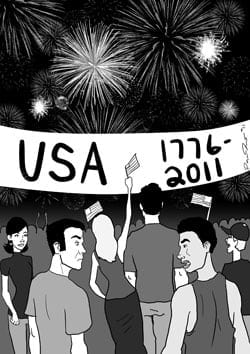
When the invisible hand fails
| “I guess America is still a work in progress.” |
With the Fourth of July celebration, thoughtful Americans reflect on the inspiring words of the nation’s Declaration of Independence, which states:
We hold these truths to be self-evident, that all men are created equal, that they are endowed by their Creator with certain unalienable rights, that among these are Life, Liberty and the Pursuit of Happiness.
Despite the nobility of those principles, Americans found it difficult to determine whether it was acceptable for some to be slaves while others were free. With the issue unresolved 85 years after publication of the independence proclamation, the young nation became embroiled in a bloody civil war to determine the legitimacy of slavery.
The anti-slavery position prevailed but it was not until the passage of the Civil Rights Act of 1964 and the Voting Rights Act of 1965 that the rights of the descendants of former slaves were established in the law.
While Thomas Jefferson and fellow revolutionaries were drafting the Declaration of Independence, Adam Smith, a Scottish economist and philosopher, was about to publish in 1776 “The Wealth of Nations,” a book that greatly influenced economic thought. As a result, while most 18th century Americans enjoyed political liberty, those of an entrepreneurial bent also benefitted from the economic principle of free markets.
According to Adam Smith, the law of supply and demand will appropriately allocate resources as long as individuals are able to compete in a free market. Over the years the principle of a free market has gained the status of religious doctrine. Political conservatives and many of those involved in the executive levels of commerce and industry still assiduously affirm their support of the principle.
In colonial times the affluent were primarily merchants or large farmers and land owners. Then the economic system was simple and essentially self regulating; but after the Industrial Revolution (1820-1870) the business place became more complex. Now with the sophistication of industrialization and high technology some regulation is necessary. There is still relatively free entry to the marketplace, but government regulation is required when “the invisible hand” of Adam Smith fails.
Much of today’s political conflict in America is the result of a difference of opinion between the conservatives who support an unfettered marketplace and the so-called liberals who see a need for government regulation. The problem is that destructive policies of major industries can cause businesses to fail, with great damage to the nation’s economy.
In the recent recession the government invested taxpayers’ funds in companies considered to be “too big to fail” in order to prevent an economic meltdown. But without a sound philosophical antecedent, this is a policy of moral hazard that encourages excessive risk.
It is time for conservatives to reconsider the efficacy of the classic free market principle. Without a sense of urgency the reassessment process will be slow. Aristotle observed centuries ago, “people do not easily change, but love their ancient customs; and it is by small degrees only that one thing takes the place of another …”
It took 189 years for Americans to outlaw slavery and enfranchise all the slaves’ descendants. Undue delay in strengthening the nation’s economy will put America at a great disadvantage in the battle for global business leadership.






